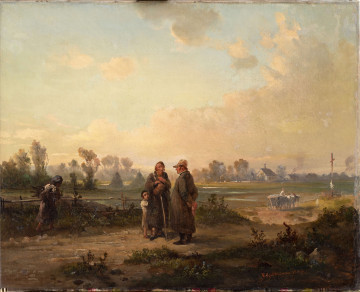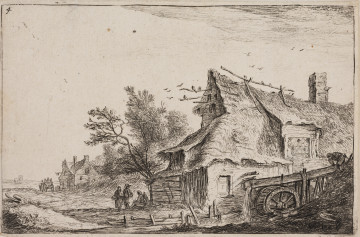
Conversation of a parson with a Jew
1857
National Museum in Lublin
Part of the collection: Portrait painting (17th–early 20th c.)
Wojciech Kossak, co-author of Panorama Racławicka and Berezyna, portraits of emperors Wilhelm II and Franciszek Józef, marshals Foch and Piłsudski, numerous battle scenes, in his work proposed still the most recognisable vision of the past and shaped the most recognisable formula of official art. Combining the technique of a skilful realist with detailed studies of historical scenes, he created a vast panorama of events and figures, repeated in numerous shots. The images he painted shaped imagination and collective memory. He was equally efficient in building the popularity and success of his work, becoming the prototype of the businessman artist. In the 1920s, the studio run together with his son Jerzy became a manufactory; the "production" reflected the needs and taste of the public in the country regaining independence. Kossak specialised in images of horses, repeating this theme as evidence of nostalgia, but also as an attribute of contemporary prestige.
Chłopiec na koniu [The Boy on Horseback] also belongs to this genre, breaking the traditional English profile presentation with a freer arrangement, a bolder take en trois quarts. The outdoor scene, with its strong framing of the figure on horseback, firmly in the foreground, dominates the image of women working in the field in the background, combining the expressive characterisation of the model with a scene of rural idyll.
In this pattern, he repeated successive images of numerous clients, changing the physiognomies of the figures, slightly changing their pose and shape. "I am dizzy, there are so many requests for portraits [...] There is a lot of work, simply a mad frenzy; they say that currency is not a business, shares are not a business either, Kossak's paintings go up most and most quickly".
The use of a schematic scene with the depiction of various models strengthened the circle of conservative values - associated with tradition, order, order inscribed in the cycle of nature, exposing the figure of a rider in fashionable earthen costume. Kossak developed the tradition of academic painting - showing an idyllic scene uprooted from the course of history, revolutionary, artistic and civilisational turbulences of the epoch, responding to the general taste and desire for stabilisation.
Marcin Lachowski
Author / creator
Dimensions
cały obiekt: height: 100 cm, width: 115 cm
Object type
painting
Technique
oil technique
Material
canvas, oil-based paint
Creation time / dating
Creation / finding place
Owner
The National Museum in Lublin
Identification number
Location / status

1857
National Museum in Lublin

between 1626 — 1700
National Museum in Szczecin
1911
National Museum in Lublin
DISCOVER this TOPIC
Castle Museum in Łańcut
DISCOVER this PATH
Educational path